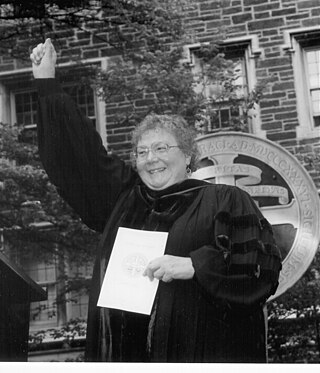Stephen Charles Mott is a teacher among Evangelical Christians in the U.S., focusing on the teaching and academic study of social ethics since the early 1970s.
David Schmidtz is a Canadian-American philosopher. He is Presidential Chair of Moral Science at West Virginia University's Chambers College of Business and Economics. He is also editor-in-chief of the journal Social Philosophy & Policy. Previously, he was Kendrick Professor of Philosophy and Eller Chair of Service-Dominant Logic at the University of Arizona. While at Arizona, he founded and served as inaugural head of the Department of Political Economy and Moral Science.
Divinity is the study of Christian theology and ministry at a school, divinity school, university, or seminary. The term is sometimes a synonym for theology as an academic, speculative pursuit, and sometimes is used for the study of applied theology and ministry to make a distinction between that and academic theology.
John Bainbridge Webster (1955–2016) was an Anglican priest and theologian writing in the area of systematic, historical, and moral theology. Born in Mansfield, England, on 20 June 1955, he was educated at the independent Bradford Grammar School and at the University of Cambridge. After a distinguished career, he died at his home in Scotland on 25 May 2016 at the age of 60. At the time of his death, he was the Chair of Divinity at St. Mary's College, University of St Andrews, Scotland.

Anantanand Rambachan is a professor of religion at St. Olaf College.
Rev. David Hollenbach, S.J. is a Jesuit priest, professor, author, and moral theologian currently serving as the Pedro Arrupe Distinguished Research Professor of the Walsh School of Foreign Service at Georgetown University. He is a consultant to the Jesuit Refugee Service and is the recipient of the John Courtney Murray Award from the Catholic Theological Society of America in 1998.

James F. Keenan is a moral theologian, bioethicist, writer, and the Canisius Professor of theology at Boston College.
Dennis P. McCann is the Wallace M. Alston Professor of Bible and Religion at Agnes Scott College in Atlanta/Decatur, Georgia, where he teaches in the fields of religious social ethics, comparative religious ethics, philosophy of religion, and Catholic studies. Before his tenure at Agnes Scott College beginning in 1999, McCann was Professor of Religious Studies at DePaul University in Chicago. In 1992 he was named the first annual holder of the Wicklander Chair in Business and Professional Ethics at DePaul University.

Willie James Jennings is an American theologian, known for his contributions on liberation theologies, cultural identities, and theological anthropology. He is currently an associate professor of systematic theology and Africana studies at Yale University.
Clare Palmer is a British philosopher, theologian and scholar of environmental and religious studies. She is known for her work on environmental and animal ethics. She was appointed as a professor in the Department of Philosophy at Texas A&M University in 2010. She had previously held academic appointments at the Universities of Greenwich, Stirling, and Lancaster in the United Kingdom, and Washington University in St. Louis in the United States, among others.
Jon Harlan Roberts is an American historian and the Tomorrow Foundation Professor of History at Boston University.
The Journal of Law and Religion (JLR) is a triannual peer-reviewed academic journal edited by the Center for the Study of Law and Religion and published in collaboration with Cambridge University Press. Its primary interests include topics related to the relationship between religion and law, including subjects related to theological jurisprudence and political theology.
Maria Massi Dakake is an American scholar of Islamic studies and associate professor of Religious Studies at George Mason University. Her research mainly focuses on Islamic intellectual history, Quranic studies, Shi`ite and Sufi traditions, and women's spirituality and religious experience. She was a contributor to The Study Quran - a modern verse-by-verse commentary of the Quran.
The Society of Christian Ethics (SCE) is a non-denominational academic society that promote scholarly work in Christian ethics and the relation of Christian ethics to other ethics traditions. Its members are faculty and students at universities, colleges, and theological schools primarily in the United States, Canada, and Europe.

Beverly Jean Wildung Harrison (1932–2012) was an American Presbyterian feminist theologian whose work was foundational for the field of feminist Christian ethics. She taught at Union Theological Seminary in New York City for 32 years.
Cécile Laborde is a professor of political theory at the University of Oxford. Since 2017, she has held the Nuffield Chair of Political Theory and in 2013 she was elected a Fellow of the British Academy. Her research focusses on republicanism, liberalism and religion, theories of law and the state, and global justice. Her most recent book, Liberalism's Religion, was published by Harvard University Press in 2017.
Kimberly D. Bowes is an American archaeologist who is a professor of Classical Studies at the University of Pennsylvania. She specializes in archeology, material culture and economics of the Roman and the later Roman world. She was the Director of the American Academy in Rome from 2014–2017. She is the author of three monographs.

John Wall is an American educator and theoretical ethicist who teaches at Rutgers University Camden. He is director of the Childism Institute and co-director of the Children's Voting Colloquium.
William Francis May was an American ethicist, academic, theologian, and ordained Presbyterian minister. His work focused primarily on questions of medical and bioethics, professional ethics in general, and public responsibility and policy.
Margaret Ruth Miles is an American theologian and historian who was president of the American Academy of Religion in 1999 and dean of the Graduate Theological Union from 1996 to 2001. A 1982 Guggenheim Fellow, she has written and edited dozens of books, including Augustine on the Body (1979), Image as Insight (1985), Immaculate and Powerful (1985), Shaping New Vision: Gender and Values in American Culture (1987), Seeing and Believing: Religion and Values in the Movies (1997), Plotinus on Body and Beauty (1999), Carnal Knowing (2006), Desire and Delight (2006), and A Complex Delight (2008).




